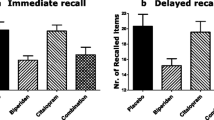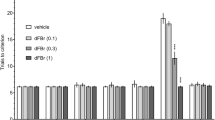Abstract
Rationale: The cholinergic system is considered to be essential for attention and the degeneration of the cholinergic system in Alzheimer’s disease (AD) correlates with the cognitive decline seen in AD patients. The serotonergic system also degenerates in AD, but its role in the modulation of cognitive functions, especially attention, is somewhat unclear. Objectives: The present study investigated possible differences between cholinergic muscarinic and nicotinic receptor mediated mechanisms, the role of serotonin (5-HT) and the interaction between the cholinergic and serotonergic systems in the modulation of attention and response control. Methods: The influences of cholinergic receptor blockade and 5-HT lesions on the performance of rats in the five-choice serial reaction time task were assessed. The 5-HT lesions were neurochemically verified. Results: The neurochemical analysis indicated that the levels of 5-HT and 5-hydroxyindoleacetic acid were reduced quite specifically in the hippocampi, parieto-occipital and frontal cortices, and in the striatum of both p-chloroamphetamine (pCA) and 5,7-dihydroxytryptamine (5,7-DHT) lesioned rats. The behavioural results showed that the pCA lesion caused a transient increase in impulsivity whereas the 5,7-DHT lesion temporarily reduced the motor activity and slightly impaired choice accuracy. Furthermore, the blockade of central muscarinic receptors by scopolamine (0.075 and 0.150 mg/kg), but not nicotinic receptors by mecamylamine (1.0 or 3.0 mg/kg), impaired the choice accuracy, whereas the blockade of both muscarinic and nicotinic receptors interfered with motor activity, though possibly via peripheral mechanisms. Interestingly, mecamylamine (3.0 mg/kg) reduced impulsivity, whereas scopolamine slightly increased it. Serotonergic lesions did not make the rats more susceptible to the effects of cholinolytics on choice accuracy. Conclusions: 5-HT system is not essential for the modulation of attention, but it is important in the modulation of response control. Central muscarinic receptors are important in the modulation of attention, whereas central nicotinic receptors may be more essential in response control. The results do not support there being an interaction between the serotonergic and the cholinergic systems in the modulation of attention.
Similar content being viewed by others
Author information
Authors and Affiliations
Additional information
Received: 31 August 1998 / Final version: 16 August 1999
Rights and permissions
About this article
Cite this article
Ruotsalainen, S., Miettinen, R., MacDonald, E. et al. Blockade of muscarinic, rather than nicotinic, receptors impairs attention, but does not interact with serotonin depletion. Psychopharmacology 148, 111–123 (2000). https://doi.org/10.1007/s002130050032
Issue Date:
DOI: https://doi.org/10.1007/s002130050032




